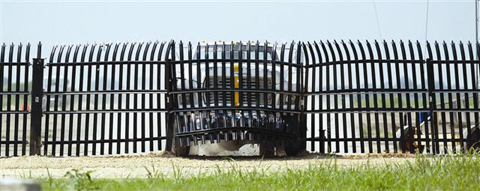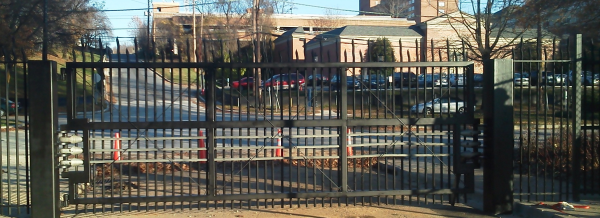AT/FP perimeter security systems are needed in any area that is in danger of attack from outside forces. Most commonly, we think of military bases, federal buildings and jails for this type of elevated security fencing. Other fence customers that are currently using this type of security are schools, banks, high tech data centers, and many other purposes. Typically any place that is housing large quantities of information, important people and money are high on the terror watch list. These fences are also commonly used by military and civilian airports and at nuclear power and industrial plants. In addition to these, federal institutions utilize this product for reserve banks, the Federal Bureau of Investigations and many other government fence needs. Very high levels of protection are essential in the mentioned target areas. ATFP fences are used for the protection of products, personnel and the general public. These types of institutions have been terrorist targets in the past, and because of this, AT-FP fence was developed.
ATFP stands for Anti-Terrorism/Force Protection, as defined by the US Army and other federal entities. The term refers to the amount of force a structure can withstand without being penetrated by an incoming vehicle. AT-FP ratings are achieved by reinforcing a fence structure with steel cables that run along the fence, into the ground, terminating into large concrete footers. Cable fence reinforcement consists of 2 cables stretching laterally at heights of both 30 and 35 inches. These specific heights are set at 30†to address cars and 35†for trucks. These cables are installed to meet Anti-Terrorism Force Protection fence standards. With these reinforcing ATFP cables and/or beams, a structure achieves certain ratings as detailed below. These ratings are typically referred to as “K†ratings, or crash ratings.
A ‘K' rating is a Crash Test Certification issued by the Department of State (DOS) to a fence, gate, barrier or bollard indicating the perpendicular impact penetration of a vehicle of a specific weight at a specific speed. In other words, it measures the particular stopping power of a barrier in relation to the speed and weight of an incoming vehicle. The K-rating weight of the vehicle is standard at 15,000 lbs. These DOS standard barriers allow the truck to penetrate no more than 36 inches past the bed. There are three ratings that are achievable; K4, K8, and K12.
-
A K-4 system, which is two 3/4" cabling with concrete anchoring deadman will stop a 15,000 pound vehicle traveling at 30 miles per hour.
- A K-8 system with two 3/4" cabling and 1" cable with concrete deadman will halt a 15,000 pound vehicle at a maximum speed of 40 miles per hour.
- A K-12 system with three 1" cables will prevent penetration of a 15,000 pound vehicle with a maximum acceleration 50 miles per hour.

These k-ratings can be achieved by any combination of natural and manmade features when natural barriers are not sufficient or present. Distance alone can be a great ATFP device when used in combination with an uneven or bumpy surface. This can also be achieved with ditches and berms, or large bolder (3ft. x 5ft.) placement and forestation. This will slow down any moving vehicle or a truck bomb that is attempting to implode a building surface. Remember that AT/FP perimeters are specifically intended to stop only vehicle traffic. This perimeter prevents a bomb threat, not theft.
These ratings are also being covered by American Society for Testing and Materials or ASTM. ASTM International is a globally recognized leader in the development and delivery of international voluntary consensus standards. Today, some 12,000 ASTM standards are used around the world to improve product quality, enhance safety, facilitate market access and trade, and build consumer confidence. ATSM fence is also available by qualified fence professionals.
Article contributed by Meagan Stone



